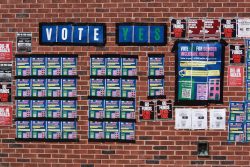It sounds like an idyllic, almost utopian community: 16 groups of four students united by common interests and a commitment to social justice living together on a block of colorful townhouses just outside the main gates of Georgetown. But even if Magis Row—the new living and learning community that Residential Life has created for the 2009-2010 school year—manages to live up to the University’s high expectations, which seems unlikely given its ambiguous mission, the program’s benefits wouldn’t outweigh the damage it does to the student body as a whole. By taking 16 townhouses out of the housing lottery, the program subverts the fairness of the housing selection process and unduly favors a group of students hand-picked by the University over the general student population.
To live on Magis Row, four rising juniors or seniors simply need to pick a common interest—“you are only limited by your imagination!” the ResLife website crows—and fill out an application to live in one of the townhouses. On paper, this sounds like just the kind of community the University should try to promote. If ResLife chooses groups with focused interests and true dedication, the block could become an asset for the larger Georgetown community, not to mention a selling point for Admissions. But because the program is open to students without housing eligibility, and because the townhouses they’ve chosen are some of the most desirable on campus, Magis Row runs the risk of attracting students interested more in getting prime housing for their senior year than in “foster[ing] community” and “giv[ing] back to the Georgetown neighborhood.”
Those students who will try to live on Magis Row simply because it has outstanding townhouses can’t be faulted. But the eligibility and housing lottery system is competitive enough as it is without taking 16 homes—space for 64 students—out of the general pool.
Magis Row will only accept students who are in “good academic standing and have no/low level judicial history.” The University townhouses on the block of 36th street between O and P streets, where the row will be located, are also some of the few which face residential homes. These two facts suggest an additional motive for the University to launch this initiative: cutting down on the partying and noise on the block for the neighbors. Improving town-gown relations is certainly a worthy goal but also one that can be achieved in a manner less detrimental to the overall student population at Georgetown. The same can be said for building the type of community the University hopes to create on Magis Row. The spirit of the program is commendable, but the cost is just too high.




